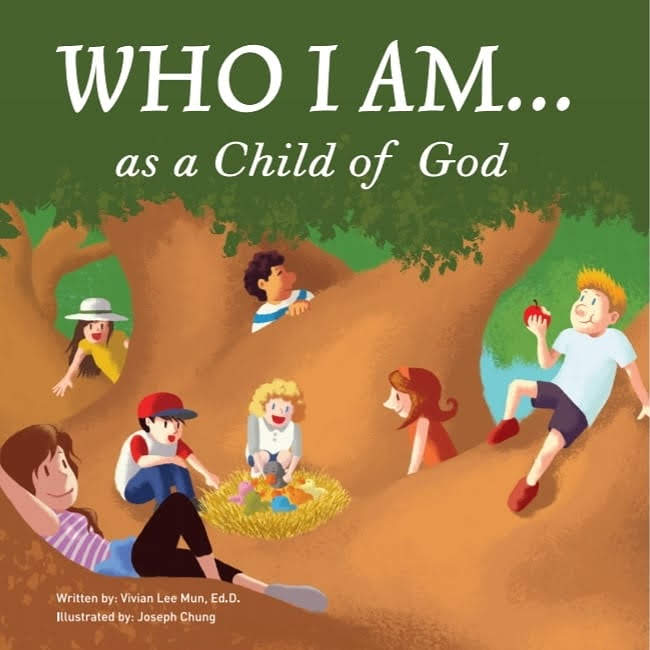This interview is part of our Conversations with SOLA series, in which we interview people who love Jesus doing things for Jesus with excellence and distinctiveness.
Christians can often divorce their spiritual lives from their day-to-day lives and professions. But we believe that God wants us to use our careers and talents to impact the world for His Kingdom, whether we work in technology, education, or the local coffee shop.
Today, we are sharing an interview that SOLA did with Dr. Vivian Lee Mun, author of the children’s book, Who I Am… as a Child of God. She wrote this book to help parents and their children have meaningful conversations about what it means to be a child of God in a simple yet powerful way. Using the book as a guide, Dr. Mun also teaches workshops on how to communicate with your child about identity.
Update: In July 2023, Dr. Vivian Lee Mun published a listening journal that goes along with her book. It allows children to reflect on the word of God through simple journaling.
Q: So how did you get started writing this book?

In May 2017, I made the hard decision to quit my job as a tenure-track assistant professor to stay home with my children. My older son was going to start kindergarten, and I wanted to be there to drop off and pick him up from school and just be generally more available for both my kids.
Soon after, I felt like God was telling me that this was the time to start making videos for my children, specifically of what He has taught me throughout the years.
As I was in the process, I realized it would be easier to access this information in some type of written form. So I started asking myself, “What is the one message I want to leave my children?” After meditating on this question, I realized that what I really want my children to have is a relationship with the Father and to know who they are as His children.
I woke up one morning, and the verses for a book just started flowing from my heart and mind. They were about what we are capable of because we are His children. However, as I was writing the verses down, I knew this couldn’t be my first book. My book had to first answer the question, “Who am I as a child of God?” So, I prayed into this question and asked God to give me truths about our identity as His children. And that’s what my book is about.
Q: How can we communicate with our children clearly about their identity in Christ?
When my kids were younger, my devotions [with them] used to look like this: I would read a story from a picture Bible, we would talk about it, and then they would pray. The problem was, as much as I loved it, it was very hard for them to immediately apply the Biblical story.
They would think, “I read the story about Noah building the ark. What does that have to do with me?” Because they both were under 5 years old at the time, it was difficult in their developmental stage to make a real-life, personal application. So, I tried to write a book that was very direct and clear: If this is who God is, then this is who I am.
Because it is a children’s book, many people think that they need to read it in one sitting; But this book is more of a devotional tool. I encourage all parents and children to focus on one “I am” page at a time and meditate on what they are reading. My hope is that through regular meditation, kids can deepen their understanding of who God is and their identity as children of God.
“So, I tried to write a book that was very direct and clear: If this is who God is, then this is who I am.”
The book is also focused on Biblical truths, so there are Bible verses hidden on every “I am” page, like a fun treasure hunt. Older children can locate the actual verse in the Bible and read it aloud. For the younger children, I tried to paraphrase the Bible verses and have it repeated so kids can focus on different keywords each time. This helps all children to slow down and think about the Bible verse in a reflective way.
One night, my husband and I were discussing the “I am a bright light” page with our kids. My older son told us about a girl at his school who often throws away her lunch that her mom made her and secretly buys the school lunch instead. I knew this was a teachable moment because he looked like he wanted to do that, too. So I reminded him that he is a child of God and asked him, “When we hide things from our parents, are we being who we are meant to be? Remember how it says in the book, ‘I am a bright light’ and ‘God fills us with His light?’ When we do things behind our parents’ backs, are we shining His light?”
By having these discussions, I pray my children’s understanding of their identity will inspire them to seek God and make choices that honor Him, especially whenever they face any difficult situation in life. We also regularly ask our kids: “Who are you?” They remember and respond, “I am a child of God.”
Q: Why do you think identity is so important for children?
We live in a time of confusion where the world tells us that things such as our looks, our feelings, our career, the amount of money we make, or the number of likes and friends on social media define our identity. Through my book, I hope that it will bring more clarity of Biblical truths of who God is and who we are as children of God.
As followers of Christ, I believe we have to talk about identity with our kids intentionally and proactively. If we, as parents, don’t teach our children about identity, someone else will. It could be their peers, their teachers, school, the media, etc.
I also believe we have to teach our children with specificity and clarity. For example, we can teach them that if God can give David courage, He can give you courage. So have them say it aloud, “I am a child of God. I am courageous.”
In addition, the topic of identity was really important to talk to both of my children because one of them is adopted. Struggling with identity is difficult, especially as an adolescent. However, for adopted children, being confident in one’s identity can be even more challenging. So, in my book, I wanted to make sure there was a page that clearly stated, “I am adopted.” This page has been a tool to talk about adoption in an open and positive away. God is our Heavenly Father who adopted us as His sons and daughters.
Q: What are some tips you would give parents who are trying to teach their children about their identity in Christ?
I believe that it is important for parents to connect with their children by creating a safe atmosphere where kids can regularly share their feelings, especially negative ones. I want my book to be used as a tool to open up a dialogue about identity. These discussions can provide teachable moments for children where parents can guide them towards God’s love, healing, and power.
One specific strategy I like to share with parents is to ask your kids questions about the opposite of God’s truths. For example, for the “I am loved” page, you can ask your children questions like, “Is there a time when you didn’t feel loved? Who made you feel that way? How did that make you feel? Even though you didn’t feel loved, what does God say about who you are? What does God say about the person who didn’t make you feel loved?” This strategy helps bring the lies to surface that they believe about themselves and God. Parents can then help their kids address and counter these lies with Biblical truths.
Sometimes, children may have traumatic experiences or painful memories that can make it difficult for them to fully accept and believe in the truths of who they are as children of God. So, it is helpful to ask about specific incidents where they may have felt disappointment, pain, or hurt, and then close these memories with God’s healing power.
For example, my son and I were talking about the “I am never alone” page. I asked my son, “Was there ever a time you felt alone?” My son recounted, “Ya, when I thought I lost mommy at the market.” Then I probed further, “Okay, but what happened after that?” My son replied, “I found you.” I reassured him, “That’s right. You found me. God led you to me. If you ever feel alone or get lost again, pray to God. He is always with you.”
“Let’s say it together, ‘I am never alone. God will never leave me.’” Bringing resolution to painful memories helps children heal and point them back to the truth, which will empower them in future difficult circumstances.
Lastly and most importantly, I encourage all of us to fervently pray over our children the Biblical truths of God and our identity as His children. I say pray over “our” children because I believe that God wants us to not only pray into our own children but into the next generation as a whole. Let’s pray that this next generation would know God’s love in an intimate way, claim their identity, and walk out their impactful destiny as children of God.

